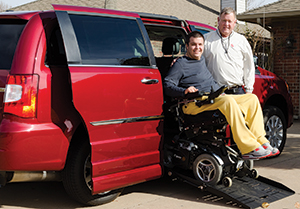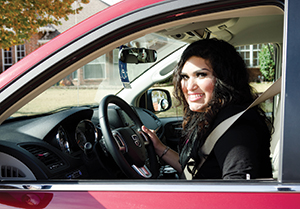Driving Lessons
 As the summer of 2009 drew to a close, 17-year-old Kaden Guerra was looking
As the summer of 2009 drew to a close, 17-year-old Kaden Guerra was looking
forward to being a senior at Edmond North High School. Already, he had a college football scholarship waiting in
Tulsa.
Nothing was out of the ordinary
the day he visited Lake Eufaula, until Guerra slipped off the back of a boat
and dove into only a half a foot of water. The resulting neck injury left the
tenacious teenager paralyzed. But Guerra is not one to let that stop him,
exemplified through his recent efforts to do what many of us take for
granted—drive.
Two weeks after successfully
completing his driving test, Guerra sits behind the wheel of a uniquely
equipped van, the literal vehicle of his independence. The inside of the van
has been modified to steer with the easy turn of a lever. The front seat has been
removed and a ramp leads through the side door to perfectly accommodate
Guerra’s wheel chair. All of this is made possible because of the work of
Edmond resident, John McGivern and the Dan Lutz Rehabilitative Driving Program,
in addition to the help offered through the state’s Department of
Rehabilitation Services.
The program offers driving
instruction for those facing challenges from a physical disability. “Since day
one I wanted to get back and be a productive citizen and not let this tie me
down forever. Just stay in a house and be blocked off from the world? No way! If
you’d known me before my accident…No way!” Guerra says.
McGivern has been working in
rehabilitation for 34 years. He began by teaching rehabilitative driving during
the summers while in his role as a football coach at UCO. At the time, the
driving program was run out of the university. Upon his retirement and a
transition for the program by the university, McGivern was offered the chance
to take the business private and handle all cases for the state of Oklahoma.
Over the years he has taught a
host of inspiring students to drive. One such student was a man named Dan Lutz,
who became the namesake for the driving program. Lutz had a big heart, a great
sense of humor, and cerebral palsy. McGivern explains that the two became fast
friends and before Lutz lost his battle with cancer, they formulated the idea
for a separate non-profit organization to help others who were disabled.
Now McGivern, along with
employees Mark Howard and Kelly Jobe, stays very busy traveling statewide to
help people. McGivern has worked with at least 4,000 people in the last ten
years alone.
 One of the services provided is
One of the services provided is
that the instructors come to the student, working with them on a one-on-one
basis until they are comfortable to pass certification and drive. This style
worked perfectly for Edmond resident Erika Ochoa, who has muscular dystrophy, a
weakening of the muscles that has left the young mother and college student in
a wheelchair. “He’ll tell you whenever he feels like you’re ready. Then, if
you’re not ready he’ll train you even longer. I liked it; you can do it
self-paced,” she says.
The bravery and hard work have
paid off for her. “I’m out of the house every day now,” she says of going to
college and taking her son wherever he needs to go. “I wouldn’t be able to do
it without my car—it would be more difficult for me to find ways to feel
independent,” Ochoa says.
For Guerra, the ease of the
services and McGivern’s commitment to his work, made all the difference. “They
come to you. They fit around your schedule. It’s just awe-some, just thinking
you can be driving again is a big freedom,” he says.
McGivern credits technology and
the state agency that helps pay for the necessary equipment for the vans; some
costs range higher than $90,000. “What makes this happen is the Department of
Rehabilitation Services. Their counselors and their agency are the ones that
pay for the program and help these people be independent and help them go to
school, find work,” he says, adding, “Everybody gripes about government
programs but this program actually works. I’ve seen it help so many people and
without it I don’t know where they would get that help.”
“It’s just amazing to see
people’s forgiveness and just their resolve to take a lousy hand and make it a
good one. That’s not easy to do. I just feel fortunate to have been a part of
so many special people’s lives,” he says.
It sounds like, for McGivern and
the rest of us, when it comes to lessons in triumph, it’s the students who are
doing the teaching.




